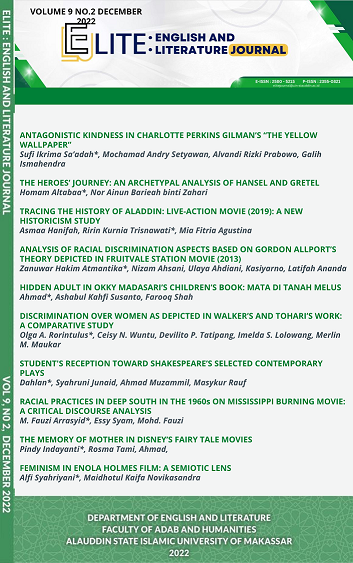HIDDEN ADULT IN OKKY MADASARI’S CHILDREN’S BOOK, MATA DI TANAH MELUS
Abstract
Okky Madasari is an Indonesian novelist who is popularly known as a critic who used to voice social criticism through her writings. However, such social criticism appears not only in her adult novels but also in her children’s novels. In 2018, she first published a children’s book entitled Mata di Tanah Melus, a novel that talks about the adventures of Matara, a 12-year-old girl in the land of Melus, East Nusa Tenggara, Indonesia. This novel receives appreciation both from readers and scholars, and some scholars have examined how social criticism is reflected in the novel. However, none have analysed the reason why Madasari urges social criticism in this children’s book. Therefore, this research aims to discuss the complexity of this children’s book and to uncover why social criticism is insisted in Mata di Tanah Melus. This is descriptive analysis research in which the researchers’ attention focuses on the structure of the novel through close reading. Close reading here means the researchers read the novel several times in the way which Perry Nodelman has suggested: “reading as an adult versus reading as a child” in reading children’s fiction. The result shows that Mata di Tanah Melus is too complex for children’s readers. The complexity can be seen from the high-level language as well as the complicated idea of the story. The complicated issues are clearly seen from the way in which the author insists on social criticism as her ideology, as she has always done in her adult novels. Thus, this research is in line with Nodelman’s theory that there is always a hidden adult in children’s novels.
Downloads
References
Andalusia, A., Thahar, H. E., & Manaf, N. A. (2019). Social Criticism on Formal Education Systems in Indonesia in Children ’ S Novel Series Mata, Okky Madasari. 1–7. https://doi.org/10.4108/eai.19-7-2019.2289484
Bahasa, B. P. dan pembinaan. (2020). Diskusi daring bedah buku novel Mata Di Tanah Melus. https://www.youtube.com/watch?v=qrNSEdVaIVE&t=21s
Bierman, V. (1991). Authorgraph No. 69: Anne Fine. Books for Keeps, 69, 16–17.
Budiyanto, A., & Latifah. (2020). Social Justice in the Fiction Series of ’ Mata ’ Okky Madasari for Girl ’ s Education. 2020, 1–9. https://doi.org/10.18502/kss.v4i10.7377
Destin, S. J. (2018). Beyond Show Don’t Tell: Creating Complex Child Narrators in Adult Fiction. University of Washington.
Eagleton, T. (2003). Marxism and literary criticism. Routledge.
Fowler, R. (2013). Linguistics and novel. Routledge.
Hadiyanti, N. (2018). Author of The Month: Okky Madasari, antara Mata Diraya dan Matara. https://www.gramedia.com/blog/author-of-the-month-desember-2018-okky-madasari-antara-mata-diraya-dan-matara/
Hunt, P. (1991). Criticism, theory, and children’s literature. Blackwell Oxford.
Hunt, P. (2005). Understanding Children ’ s Literature.
Madasari, O. (2013). Korupsi adalah Problem Kemanusiaan. https://okkymadasari.net/read/korupsi-adalah-problem-kemanusiaan
Madasari, O. (2018). Mata di Tanah Melus. Gramedia Pustaka Utama.
Nganga, L. (2020). Analyzing children’s literature for hidden bias helps preservice teachers gain pedagogical practices in critical multicultural education. Journal of Research in Childhood Education, 34(1), 93–107.
Nodelman, P. (2008). The hidden adult: Defining children’s literature. JHU Press.
Reynolds, K. (2011). Children’s Literature: A Very Short Introduction. Oxford University Press.
Roberts, L. C., & Hill, H. T. (2003). Come and Listen to a Story about a Girl Named Rex: Using Children’s Literature To Debunk Gender Stereotypes. Young Children, 58(2), 39–42.
Satriati, W., & Hapsarani, D. (2019). Symbolic Violence in Mata Di Tanah Melus By Okky Madasari. 2019, 813–828. https://doi.org/10.18502/kss.v3i19.4907
Satriati, W., & Hapsarani, D. (2021). Social Criticism in Okky Madasari ’ s Children Novel. 593(Inusharts 2020), 326–332.
Setyorini, R. (2017). Diskriminasi gender dalam novel Entrok karya Okky Madasari: Kajian feminisme. Jurnal Desain, 4(03), 291–297.
Shavit, Z. (2009). Poetics of children’s literature. University of Georgia Press.
Sutherland, R. D. (1985). Hidden persuaders: Political ideologies in literature for children. Children s Literature in Education, 16(3), 143–157.
Wilkinson, R. (2016). Broaching ‘ themes too large for adult fiction ’: the child narrator in NoViolet Bulawayo ’ s We Need New Names Broaching ‘ Themes Too Large for Adult Fiction ’: The Child Narrator in NoViolet Bulawayo ’ s We Need New Names. 1752. https://doi.org/10.1080/10131752.2016.1153579
Yulianto, W. E. (2018). Mata di Tanah Melus: Gabungan antara yang realis and utopis untuk sastra anak yang progresif. The Conversation.
Zuckerman, P., & Shook, J. R. (2017). The Oxford handbook of secularism. Oxford University Press.
Copyright (c) 2022 Ahmad Ahmad, Ashabul Kahfi Susanto, Farooq Shah

This work is licensed under a Creative Commons Attribution-NonCommercial-ShareAlike 4.0 International License.
Once an article was published in the journal, the author(s) are:
granted to the journal right licensed under Creative Commons License Attribution that allows others to share the work with an acknowledgement of the work's authorship.
permitted to publish their work online in third parties as it can lead wider dissemination of the work.
continue to be the copyright owner and allow the journal to publish the article with the CC BY-NC-SA 4.0 license
receiving a DOI (Digital Object Identifier) of the work.


